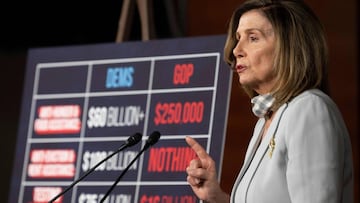Second stimulus check update: why is there no agreement?
Amid an impasse in negotiations over a coronavirus relief package in the US, Americans' wait for a second stimulus check continues.

Americans' wait for a second stimulus check goes on, amid an impasse in negotiations between White House leaders and Democratic congressional chiefs over the United States' next coronavirus relief bill.
No stimulus package expected before September
After two weeks of talks, Treasury Secretary Steve Mnuchin and White House Chief of Staff Mark Meadows proved unable to agree an outline stimulus package with House Speaker Nancy Pelosi (D-Calif.) and Senate Minority Leader Chuck Schumer (D-NY) by their self-imposed deadline of 7 August.
Lawmakers in both the House and the Senate have now gone on recess and, as things stand, a bill does not look like being pushed through before September, despite initial suggestions that discussions could be revived earlier this week.
There are a number of issues behind the failure of the negotiations, but stimulus checks don’t appear to be one of them. Republicans and Democrats agree that another direct payment is needed, and have both proposed a second round of checks that would see those who earn under $99,000 a year given up to $1,200.
Why hasn't a stimulus package been agreed?
Among the notable stumbling blocks that led talks to stall were enhanced unemployment insurance - Democrats wanted to extend a $600 weekly benefits boost until January, but Republicans proposed significantly lowering this figure - and financial aid for state and local governments. Pelosi and Schumer sought $915bn, a sum Mnuchin and Meadows were not prepared to countenance.
- Trump blames Democrats for stimulus package delay
- Stimulus check: how quickly could I get my payment?
- Stimulus check: how to track missing $500 for dependents
- Democratic National Convention: schedule, speakers, how to watch
USPS emerges as point of huge conflict
Another major source of conflict that has emerged from the negotiations is the United States Postal Service. Ahead of a presidential election in which an unprecedented number of mail-in ballots are expected as Americans avoid in-person voting due to the pandemic, Democrats sought $25bn in funding to help the USPS deal with this likely inundation of postal votes.
However, Trump, who has repeatedly stated his opposition to mail-in votes, claiming they lead to increased electoral fraud, this week indicated to Fox Business that he was against agreeing a package that would facilitate nationwide postal voting. "If we don't make the deal, that means they can't have the money, that means they can't have universal mail-in voting,” he said.
Trump accused of "all-out assault" on the USPS
Trump later sought to soften his remarks, saying he would not veto a relief bill if it included support for the USPS - but Democrats nevertheless accuse the president of trying to disrupt November’s vote by financially strangling the postal service.
Indeed, the new postmaster general, Trump donor Louis DeJoy, has overseen a raft of cut-backs to the USPS since his June appointment, leaving its ability to cope with the election rush in doubt. For example, NPR notes that DeJoy has moved to reduce postal workers' hours, take high-speed mail-sorting machines out of service and remove mailboxes.
In a statement on Friday, Pelosi and Schumer said: "The president, his cronies and Republicans in Congress continue to wage their all-out assault on the Postal Service and its role in ensuring the integrity of the 2020 election."
Pelosi and House Democratic leaders are considering cutting the August recess short and bringing the chamber back into session to deal with the unfolding crisis at the Postal Service https://t.co/NBtjXmozBq
— POLITICO (@politico) August 16, 2020
Pelosi weighs up recalling House over USPS
In the face of the growing USPS crisis, Politico says that Pelosi is considering recalling the House from its summer recess to tackle the issue, in a report confirmed to Reuters by a Democratic congressional aide.
Democratic Representative Carolyn Maloney (NY-12) this week introduced legislation seeking to prohibit changes to the USPS' January 2020 level of service until after the Covid-19 pandemic is over, and Reuters has been told by the congressional aide that the House could vote on the measure.
Related stories
According to Politico’s report, some Democrats have also suggested an early return from recess could be used to deal with other issues such as unemployment benefits, but have been told that addressing the USPS crisis must be the immediate priority.
Live, US-focused coverage of the Covid-19 crisis
You can keep yourself abreast of the latest US news and figures in the ongoing coronavirus pandemic with our daily live blog.

